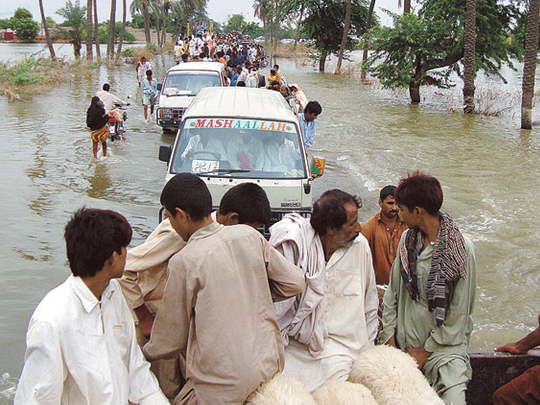
It is around sunset and I am watching the fast-spreading flood waters in Tando Hafiz Shah. The small town with a population of around 50,000 in Pakistan's Sindh province is almost completely deserted. With shops shut and all its crops submerged, Tando wears the look of a ghost town. Only a few donkeys roam its streets.
The water is moving with great speed, eroding the roads and inundating all that stands in its way. People had planted cotton, sugar cane and chillies, but now they will have no harvest. The Indus river — called Sindho in these parts — has devoured it all.
This village, the locals tell me, has never seen this much water before. Not even in the floods during the middle and late seventies. A week ago they tried to fortify the embankment on the Indus, but the river calmly breached it and raged on.
The residents of Tando have trucked, tractored and in some cases walked away from the village. Many do not know where to go and when they will return.
Shelter, food, drinking water and medical aid is their present concern. Upon their return, they will have to rebuild their lives.
Tando's story has been repeated a thousand times over in small hamlets and towns.
As the mighty Indus threatened to enter Jacobabad, our Dunya team arrived in time to witness the desperate departure of thousands of people. Packed like sardines, hundreds waited for trains to depart for Karachi and Quetta. Many fleeing in fear had no one waiting at the other end. Heat, thirst and hunger plagued them all. Crying babies, wailing women and complaining men sought to get on these ‘saviour' trains.
Not far from the station is the Shikarpur Road leading to Sukkur. It was congested with families fleeing with theior meagre possessions. The relatively well-off were leaving on trucks and tractors. Others were on foot.
As we neared a petrol pump, we spotted a few hundred women, children and a few men awaiting relief. Two hungry children were sharing a dry roti (unleaven bread).
Not too far away, a man stood near the railway track in Shikarpur. He couldn't afford a vehicle to take his old mother and family to safety. He wept like a child when we gave him two packets of chips.
In Malakand, the destroyed bridges and roads have left people to the mercy of a boat-like contraption. Several drowned when the contraption capsized in high tide. The government has made efforts to restore connectivity, but tens of thousands in Kalaam and the northern areas are stranded.
Inclemental weather forces cancellation of air sorties to drop food supplies.
This exodus of hundreds of thousands while being a testimony to human beings surrendering to nature's fury, also speaks volumes about Pakistan's criminal economic apartheid.
Economic inequality
This epic disaster, the likes of which the world has not seen in perhaps a century, has caused widespread damage. Figure crunching continues the suffering and the challenge both multiply.
According to some estimates, more than 17 per cent of Pakistan is under water. The floods have displaced over 1.5 billion Pakistanis and destroyed over 3.5 million houses, not to mention crops. Infectious diseases are on the rise and millions need medical aid on an emergency basis.
These diabolical floods that have spread destruction simultaneously in all corners of Pakistan. Hurricanes, earthquakes, floods, volcanic eruptions, tornadoes and disease may have caused the death of millions all over the world, but the Pakistan administration faces the task of reconstruction, the outrage of the displaced, and criticism about its incapacity to respond effectively to the crisis.
This mega saga has flowed from mega blunders of mismanagement by successive governments. Nevertheless, the challenge that the Pakistani state faces is clearly unmatched in modern times.
Tales about this disaster will enter the Pakistani narrative; both its folklore and its documented history. Some will say, as they now do, that nature has wreaked vengeance against the country's managers, the ruling elite's plundering of its resources and the relentless exploitation of the country's poverty-stricken.
But as my young anguished Mustafa says, "Why are the millions of poor being hit by this flood?"
Mustafa's question about nature's egalitarian spirit will torment the compassionate into eternity. Meanwhile, the only urgently needed response of the privileged is our active contribution for relief and rehabilitation.
Beyond this the deeper, the more compelling problem of economic apartheid requires a response. Can Pakistan lay down structures, mechanism and initiate processes to reduce this economic apartheid?
Nasim Zehra is a writer on security issues.










